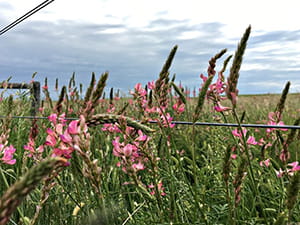By McKenzie Paget, AAg, Agri-Environmental Specialist, Weyburn
July 2024
Introducing pollinator-friendly perennial species into pastures offers several benefits, both for the environment and for agricultural productivity:

- Increased pollination: Pollinator-friendly plants attract bees, butterflies and other beneficial insects, which enhance pollination in nearby crops and wild plants. This can lead to increased yields for crops that rely on pollination such as fruits, vegetables and legumes.
- Biodiversity: Adding perennial species to pastures increases plant diversity, which in turn supports a wider range of wildlife, including birds, mammals and insects. This helps create a more balanced and resilient ecosystem.
- Improved soil health: Perennial plants often have deep root systems that help improve soil structure and prevent erosion. They contribute organic matter to the soil as they shed leaves and other plant material, enhancing soil fertility and moisture retention.
- Natural pest control: Some pollinator-friendly plants, such as certain species of flowers and herbs, can attract beneficial insects that prey on crop pests. This can help reduce the need for chemical pesticides and promote natural pest control in agricultural systems.
- Aesthetic value: Pollinator-friendly plants add beauty and colour to pastures, enhancing their aesthetic appeal. This can be particularly beneficial for agri-tourism operations or farms that host events or tours.
- Support for livestock: In addition to supporting pollinators and other wildlife, some pollinator-friendly plants also provide forage or grazing opportunities for livestock. For example, certain species of legumes like clover can be grown as part of a diverse pasture mix, providing nutritious forage for grazing animals.
Overall, integrating pollinator-friendly perennial species into pastures can contribute to more sustainable and environmentally friendly agricultural practices while also providing benefits for farmers, wildlife and local ecosystems.
